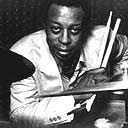
"A band like this wouldn't be complete without at least one legend," announced Louis Hayes's alto saxophonist, Vincent Herring. The lean, silent, ecstatically grinning 65-year-old Detroit bandleader took his bow. It was about the only time Hayes disturbed the pose of privately amused meditation in which he plays the drums, moving almost nothing but his forearms and feet and appearing to stare transfixed at some life-changing vision about a yard in front of his nose.
In fact, there are two legends in this quintet. The visible one is Hayes himself, who has worked with almost all the prominent figures of the 1950s and 60s hard-bop movement. The invisible one is the late alto saxophonist Julian "Cannonball" Adderley, with whom Hayes played between 1959 and 1965. The music of this quintet is therefore appropriately punchy, riff-based, boiling with virtuosic up-tempo solos, and ticks over with the captivatingly wayward beat of a supertuned sports car. But though it is a tribute band stuck in a timewarp, it is an open and spontaneous one, and the partnership of Herring on alto and the formidable young trumpeter Jeremy Pelt is just as robust as it sounds on the group's recent Dreamin' of Cannonball album.
Pelt is a real find. On Monday he was not as flamethrowingly scary as he was with Ralph Peterson's band in the same venue in February, but he explored another side of his personal take on this half-century-old idiom - the use of space, delay and suspense. Set against Herring's suitably Cannonball-like elided notes and twisting, soulful phrasing, Pelt's mix of tantalising patience and bright vigour did much to lift the group out of any tendency to repertory- playing formalities.
Hayes's slick, liquid-sounding ride beat, nudged by scattered rimshots and crash-cymbal splashes and shadowed by Tasilli Bond's bass, helped give the band the feel of the Miles Davis Quintet on its Milestones-like opener. One Daddy-O brought a riveting blend of long held notes, behind- the-beat links and half-valve squeezes from Pelt. Pianist Rick Germenson echoed the slow-build feel of the solos here, letting trills endlessly hover over slowly shifting chords. Hayes's remarkably light, rustling drumming style carried the chorus-swapping in What Is This Thing Called Love (the Adderley brothers renamed it What Is This Thing Called Soul, of course); Pelt sounded like Porgy and Bess-era Davis on muted trumpet in the thoughtful Naturally, and Bobby Timmons's funky classic Dat Dere caught the horn partnership at its most ruggedly, bluesily harmonious. This is jazz classical music really, a devoted revisit to a lovingly polished style - but the devotion certainly shines through.
· Until Saturday. Box office: 020-7439 0747.

